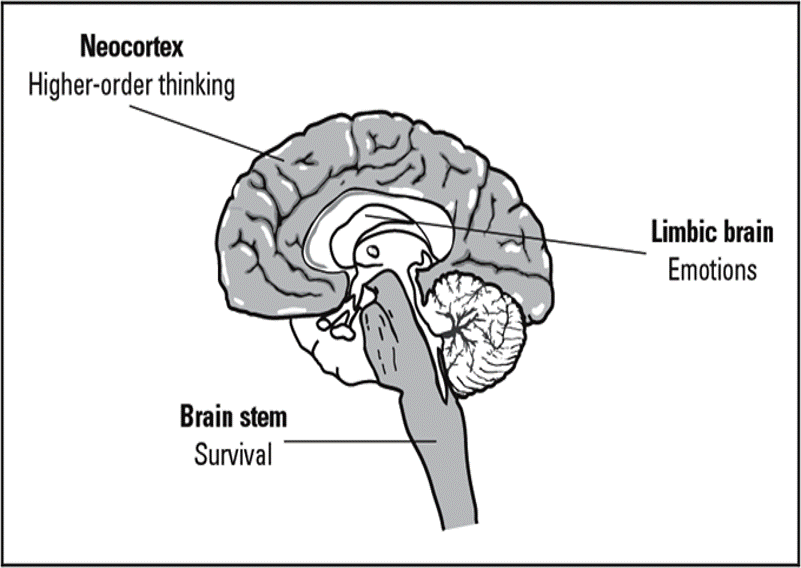Emotional Intelligence and the Brain
/In the previous post, we saw how important it is to answer the question, "What are emotions?" before we could answer the question, "What is Emotional Intelligence (EQ)?" The next thing we need is a brief overview of how the brain works. Using the triune brain theory helps to simplify something that could get very complex! This perspective is just one of many since the brain involves much more complexity than we will be discussing here.
As you can see in the photo, three layers control different aspects of human functioning. The two regions we are most interested in when it comes to EQ are the limbic region (where our emotions live) and the neocortex region (where our high-order thinking operates). The goal in EQ is to have these two regions work in tandem with one another. The challenge is that the limbic region can easily hi-jack the neocortex region because it is processing data before if reaches the neocortex. In his book, Emotional Intelligence, Dan Goleman puts it this way:
These two minds, the emotional and the rational, operate in tight harmony for the most part, intertwining their very different ways of knowing to guide us through the world. Ordinarily there is a balance between emotional and rational minds, with emotion feeding into and informing the operations of the rational mind, and the rational mind refining and sometimes vetoing the inputs of the emotions. Still, the emotional and rational minds are semi-independent faculties, each reflecting the operation of distinct, but interconnected, circuitry in the brain (p.9)
The skills that are taught in EQ are precisely aimed at helping us to slow down, so that we don't experience an "emotional hijacking." I am reminded of James' simple exhortation in James 1:19:
"My dear brothers, take note of this: Everyone should be quick to listen, slow to speak and slow to become angry, for man's anger does not bring about the righteous life that God desires."
Notice how James has to get our attention by first saying, "take note of this." It is as if he knows that we need a lot of help slowing down, so he asks us to slow down before he tells us to slow down! Jesus does something similar when he utters one simple word: "Behold!" You see it over and over again in Jesus' teachings. It is another way of getting our attention before he gets our attention.
It appears that long before the advent of modern research and neuroscience, keen observers of human behavior saw this tendency. Unfortunately, some concluded that emotions were less than human and tended to view them as inferior to thought. God is the creator of our physical bodies, and he created us with emotions. They are intrinsically good. It is what we do with them that matters. They are to be managed, but emotions can play a significant role in wise decision-making.
Goleman addresses this:
While the world often confronts us with an unwieldy array of choices (How should you invest your retirement savings? Whom should you marry?), the emotional learning that life has given us (such as the memory of a disastrous investment or a painful breakup) sends signals that streamline the decision by eliminating some options and highlighting others at the outset. In this way, Dr. Damasio argues, the emotional brain is as involved in reasoning as is the thinking brain.....The emotions, then, matter for rationality.
In essence, what Goleman is stating is that IQ and EQ, when working together create the best decision. In light of this, it is important that we do not fall into the trap of minimizing emotions or even viewing them in a negative light. When we do that, we will not grow in wisdom.
When the Apostle Paul calls us to be "transformed by the renewing of our mind," he has in view the whole person. The word that is used for "mind" is not just speaking about one's cognition but one's affections. In order to be transformed, we need the Holy Spirit to aid us in linking the thinking and feeling brains together.
In our next post, we will begin to more clearly define EQ.
Copyright © 2018 Timothy S. Lane


